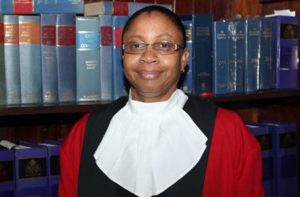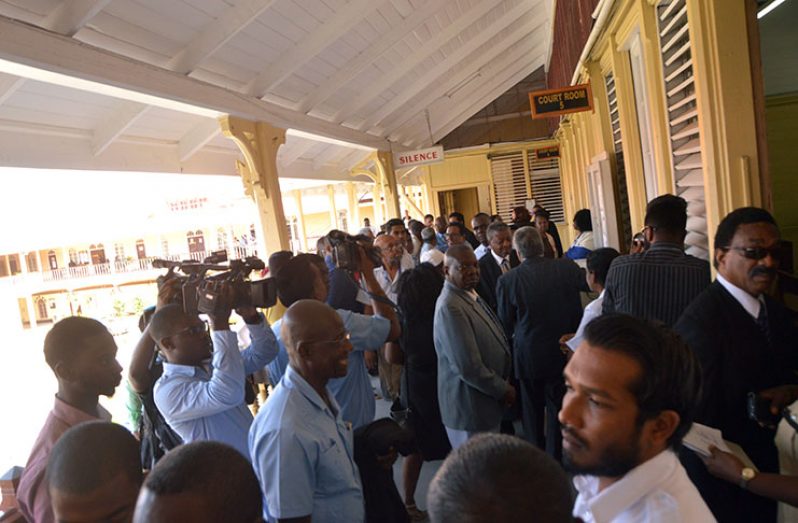… chief justice sets strict timelines for hearing of confidence vote case
…oral arguments for next week
THE High Court will rule on all matters pertaining to the validity of the no-confidence motion against the government by the end of the month, Chief Justice (ag) Roxane George-Wiltshire announced on Tuesday as she outlined strict timelines for submissions in the three substantive cases brought before her.
In a courtroom filled with of some of the country’s leading attorneys, public officials and interested parties, the chief justice (ag) underscored the importance of expediting the process, stating that the nation awaits the final outcome. “We are going to push ahead and get these matters heard as quickly as possible. I am cognisant that the nation is awaiting the outcome,” the chief justice said during the first day of the hearing on Tuesday.

She is hearing three critical constitutional matters that will determine if the nation will go to the polls before 2020. The first is a ‘Fixed Date Application’ in which a New Amsterdam farmer Compton Reid is challenging the validity of the vote by Charrandass Persaud in the National Assembly on December 21, 2018, supporting the motion. The second is another Fixed Date Application filed by Attorney General Basil Williams SC, in which he is challenging the speaker’s ruling that the motion was carried on the basis that the opposition did not secure a majority as required by the constitution; and the third was brought by political commentator Christopher Ram, who wants the High Court to rule that the no-confidence motion was validly passed.
In all three cases, written submissions by the parties involved are required on or before Friday January 18, 2019 and rebuttals by Monday, January 21, 2019.
In the case, Christopher Ram vs The Attorney General, oral submissions will be made before the chief justice (ag) on Wednesday, January 23, 2019 from 14:00hrs; while in the case of Compton Reid vs The Speaker of the National Assembly, former MP Charrandass Persaud and The Attorney General, oral arguments will be heard on Thursday, January 24, 2019 from 09:30hrs. The final case, the Attorney General vs The Speaker of the National Assembly and the opposition leader would be heard on Friday January 25, 2019 from 13:30hrs. It is expected that within the six remaining days of January, 2019, the chief justice (ag) will hand down her ruling in all three matters.
DUAL CITIZENSHIP
Ahead of laying out the timelines for the various cases, Justice George-Wiltshire heard initial statements and applications from legal counsel in each of the three cases. In the case of Compton Reid vs The Speaker of the National Assembly, former MP Charrandass Persaud and The Attorney General, Attorney Neil Boston, S.C appeared on behalf of Reid, who was seated in the public gallery, in association with Rex McKay, S.C; Robert Corbin and Stanley Moore.
The first respondent in the matter, Speaker of the National Assembly, Dr. Barton Scotland, who was also present, is being represented by Senior Counsel Rafiq Khan. The second-named respondent, recalled Member of Parliament Charrandass Persaud was represented by Attorneys-at-Law Sanjeev Datadin and Ganesh Hira, while the attorney general represented himself.
Leader of the Opposition Bharrat Jagdeo, through his lead attorney Anil Nandlall, applied and was granted permission to be party to the proceedings following a series of no-objections from the attorneys of the named applicant and respondents.
Before the chief justice (ag) granted her approval, Nandlall explained that Jagdeo being the leader of the opposition is likely to be affected by orders which may be made in the proceedings. As such, it is important for his client to be represented in the proceedings. Minister of State Joseph Harmon, in his capacity as General Secretary of the A Partnership for National Unity (APNU) was also added as a party to the matter. His application was filed by Attorney-at-Law Roysdale Forde.
NOT QUALIFIED
However, Saphier Husain-Subedar’s application to be a party to the matter as an ‘interested party’ was denied. Hussein told the court that he had been treating with constitutional cases since 1997 but this was not enough to convince the court to add him as a party.
Reid, through his attorneys, is arguing that Persaud was not qualified for election as a member of the National Assembly by virtue of his own act and acknowledgement of allegiance, obedience and adherence to a foreign power in contravention of Article 155 (1) (a) of the Constitution of Guyana, and as such, his vote was invalid. Charrandass Persaud, though Guyanese by birth, is a citizen of Canada. Article 155 (1) of the Constitution of Guyana prevents Members of Parliament from having dual citizenship. He has asked the court to issue seven declarations along with the orders, with respect to Persaud’s citizenship and the validity of the motion.
However, Persaud has filed an application asking the court to issue an order that it is without jurisdiction to grant the declarations sought by Reid. Persaud has asked the court to strike out the entire application.
Persaud, through his attorneys, is arguing that the Fixed Date Application is misconceived and without any legal merit. But when the matter came up on Tuesday, the chief justice (ag) questioned Persaud’s attorney on whether the application is proper. At the time, she was trying to ascertain from Datadin whether Counsel Anessa Chow who is also
representing the applicant can swear to an affidavit. Datadin responded in the affirmative, but the chief justice stated that Rule 30.01 of the Civil Procedure Rules is clear. Weighing in on the matter, Boston SC cited Rule 30.01 (2) which states that “No Affidavit may be admitted into evidence if sworn or affirmed by the Attorney-at-Law of the party on whose behalf it is to be used or before any agent, partner, employee or associate of that Attorney-at-Law.”
However, the chief justice (ag), while acknowledging and striking out the affidavit, allowed the application on the basis that an issue of law has been raised with respect to the jurisdiction of the court.
CONSERVATORY ORDER
Meanwhile, even before the timeline was outlined for the matter, Boston informed the court that he and his associates would not proceed with the conservatory order at this time. Standing to the floor, the attorney general told the court that in addition to his defence, he would wish to file another application to address issues of law that were omitted in Reid’s application. Saying that it is complementary and substantive, the attorney general noted that Reid’s application did not address Article 70 of the constitution. That article addresses the issue of the five-year term. He has up to today to file the application.
MAJORITY CASE
Meanwhile, the Attorney General vs The Speaker of the National Assembly and the opposition leader, the attorney general is asking the court to determine whether the Speaker’s declaration that the no-confidence motion was carried by a majority in the National Assembly is unlawful, null and void on the basis that its contradicts Article 106 (6) of the Constitution of Guyana.
Article 106 (6) of the constitution states: “The Cabinet including the President shall resign if the government is defeated by the vote of a majority of all the elected members of the National Assembly on a vote of confidence.”
On December 21, 2018, the Speaker had declared that the opposition- sponsored motion was passed after 33 Members of Parliament voted in its favour and 32 against; however, some legal luminaries have since argued that the 33 votes did not constitute an absolute majority as required by the constitution.
The attorney general was also seeking a conservatory order to preserve the status quo ante that the President and all ministers of the government remain in office until the hearing and determination of the questions have also been sought. But the chief justice made it clear that there was no need for the submissions on the conservatory order to be made on the basis that the case would be concluded within days. The chief justice emphasised that it was important to expedite the process. The speaker, through his Attorney Khan, assured the court that he will abide with the ruling of the chief justice.




.png)









